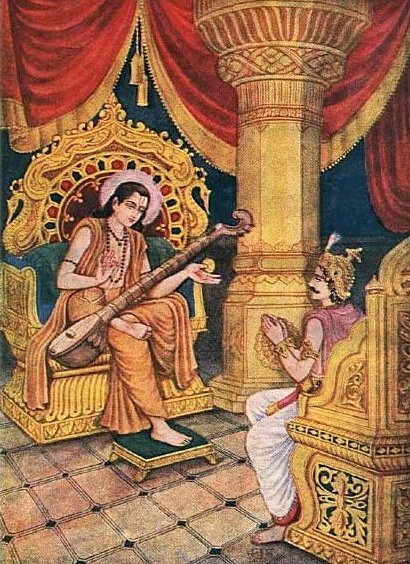
Among musical Instruments,
Đ bamboo Flute is considered d most Organic.
Now the Question is,
How did this Flute get d blessed fortune to be with Śrī Kṛṣṇa all the time?
Bhagavān’s love for His flute was such that,
Never would He leave it Here & There.
(1/11)
#ŚrīmadBhāgavata
Đ bamboo Flute is considered d most Organic.
Now the Question is,
How did this Flute get d blessed fortune to be with Śrī Kṛṣṇa all the time?
Bhagavān’s love for His flute was such that,
Never would He leave it Here & There.
(1/11)
#ŚrīmadBhāgavata

Đ Bhagavān’s Flute received the touch of the Bhagavān’s nectarean lips,
Which everyone longs for, for lifetimes together.
The Gopīs, or women of the cowherds,
were ever Jealous of the Bhagavān’s Flute,
talking to it & chiding it, saying, “You are Stealing our right.
Which everyone longs for, for lifetimes together.
The Gopīs, or women of the cowherds,
were ever Jealous of the Bhagavān’s Flute,
talking to it & chiding it, saying, “You are Stealing our right.

The Bhagavān’s lips are Our right. So long as you are seated on His lips,
We will not get to touch them.”
Someone once asked,
“O Flute,
What Meritorious deeds did You perform,
that the Bhagavān always keeps You with Him & places You on His lips?”
We will not get to touch them.”
Someone once asked,
“O Flute,
What Meritorious deeds did You perform,
that the Bhagavān always keeps You with Him & places You on His lips?”

Đ Bhagavān’s flute replied,
“I kept burning under d hot Sun.” Before she became a Flute,
She was a bamboo rod, part of a tree rooted in the ground.
As soon as She Sprouted,
She had to bear
the Heat,
the Sun,
the Rain,
&
every other facet of Nature.
She practised many austerities.
“I kept burning under d hot Sun.” Before she became a Flute,
She was a bamboo rod, part of a tree rooted in the ground.
As soon as She Sprouted,
She had to bear
the Heat,
the Sun,
the Rain,
&
every other facet of Nature.
She practised many austerities.
After much Penance, She was Uprooted & Cut,
and had to suffer more Pains.
Then,
She was Pierced—not Once, but 7 times.
Now,
If We were Pierced like this, How would We Feel?
Đ flute said she bore all this.
Đ flute is Hollow, Empty.
She does Not produce any Sound of her
and had to suffer more Pains.
Then,
She was Pierced—not Once, but 7 times.
Now,
If We were Pierced like this, How would We Feel?
Đ flute said she bore all this.
Đ flute is Hollow, Empty.
She does Not produce any Sound of her

own as such. The Bhagavān breathes life into Her,
So only those musical notes come forth from her as the Bhagavān wishes.
Not a single new note of Her own does she produce.
She surrenders herself completely. Such is her Glory.
We, too, should make Ourselves like the Flute,
So only those musical notes come forth from her as the Bhagavān wishes.
Not a single new note of Her own does she produce.
She surrenders herself completely. Such is her Glory.
We, too, should make Ourselves like the Flute,

so that we are able to bear all of life’s adversities and austerities;
&
become completely hollow Within, devoid of Blockages & Obstructions.
We typically have so many kinds of
Likes,
Dislikes,
Desires,
Anger,
& such attributes.
&
become completely hollow Within, devoid of Blockages & Obstructions.
We typically have so many kinds of
Likes,
Dislikes,
Desires,
Anger,
& such attributes.
This is why, even if the Bhagavān took us with Him,
We would just keep Singing Our own Notes,
according to Our Own Preferences & Attachments.
Just as Unwanted Notes sometimes come forth on their own,
When we sit to play d harmonium,
Unwanted egocentric tunes sometimes come Forth
We would just keep Singing Our own Notes,
according to Our Own Preferences & Attachments.
Just as Unwanted Notes sometimes come forth on their own,
When we sit to play d harmonium,
Unwanted egocentric tunes sometimes come Forth

on their own in our life. The Bhagavān says this is not good.
एवं विधा भगवतो या वृन्दावनचारिणः। वर्णयन्त्यो मिथो गोप्यः क्रीडास्तन्मयतां ययुः॥
(10.21.20)
“When Bhagavān played the sweet music of His flute,
everyone in Vrindavan Heard it & ran to Bhagavān that very instant."
एवं विधा भगवतो या वृन्दावनचारिणः। वर्णयन्त्यो मिथो गोप्यः क्रीडास्तन्मयतां ययुः॥
(10.21.20)
“When Bhagavān played the sweet music of His flute,
everyone in Vrindavan Heard it & ran to Bhagavān that very instant."

Keep in mind that if people want to hear Bhagavān Kṛṣṇa's Flute even Now, They can.
After all,
Why does the Bhagavān play the Flute?
To call Us to Him.
Just as Bells & Conches are the “Sounds of Joy” that resound to call Us to the Mandirā,
After all,
Why does the Bhagavān play the Flute?
To call Us to Him.
Just as Bells & Conches are the “Sounds of Joy” that resound to call Us to the Mandirā,
So, too, Bhagavān played His Flute to call His Devotees to Him.
Even now,
If We could reduce Our constant crying just a little,
We, too, would Hear the Bhagavān’s Flute.
ॐ श्री कृष्णाय परमात्मने नमः।
ll हरी ॐ तत् सत् ll
।।जयतु सनातन धर्मः।।🙏
Even now,
If We could reduce Our constant crying just a little,
We, too, would Hear the Bhagavān’s Flute.
ॐ श्री कृष्णाय परमात्मने नमः।
ll हरी ॐ तत् सत् ll
।।जयतु सनातन धर्मः।।🙏

• • •
Missing some Tweet in this thread? You can try to
force a refresh















